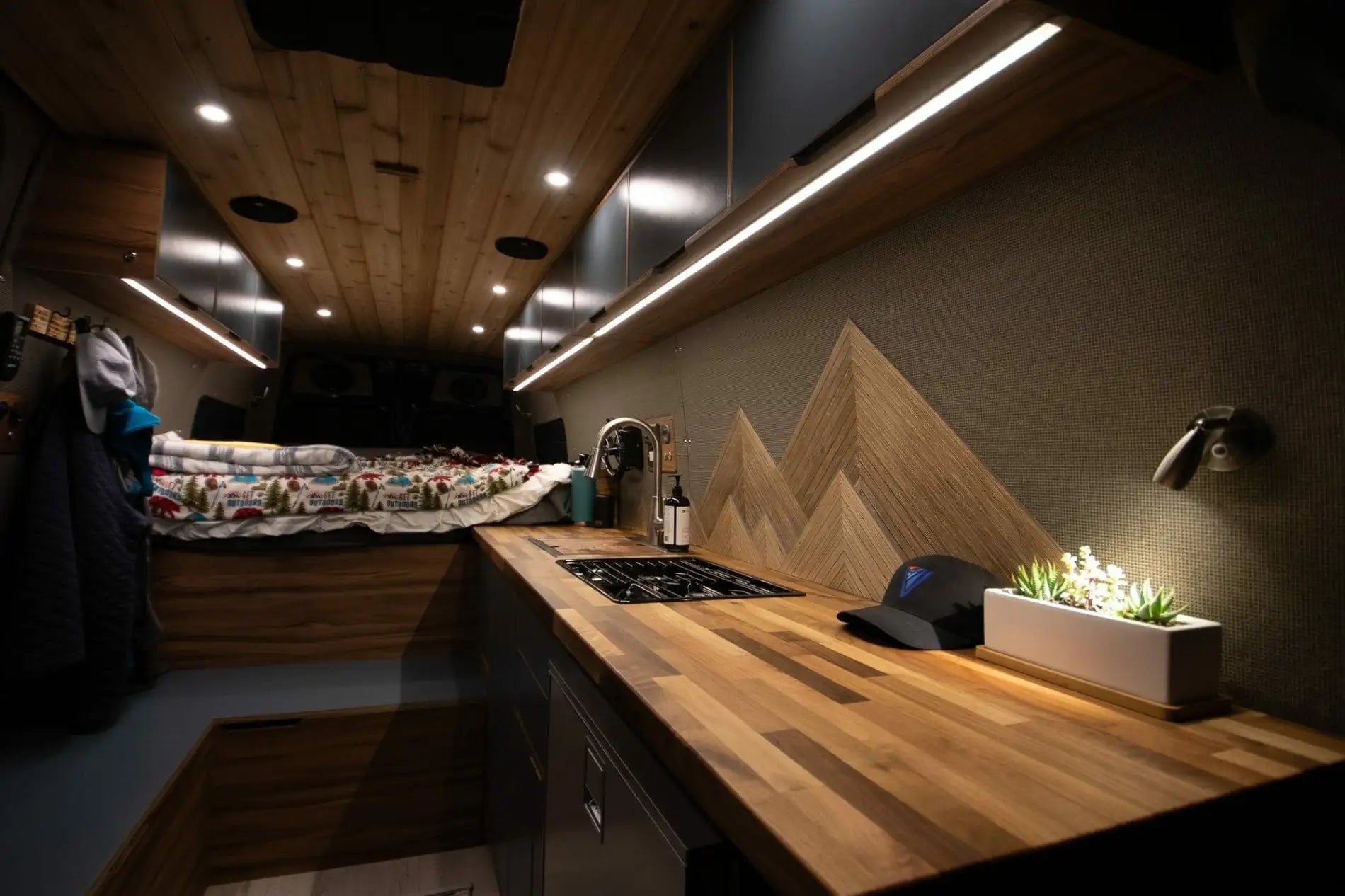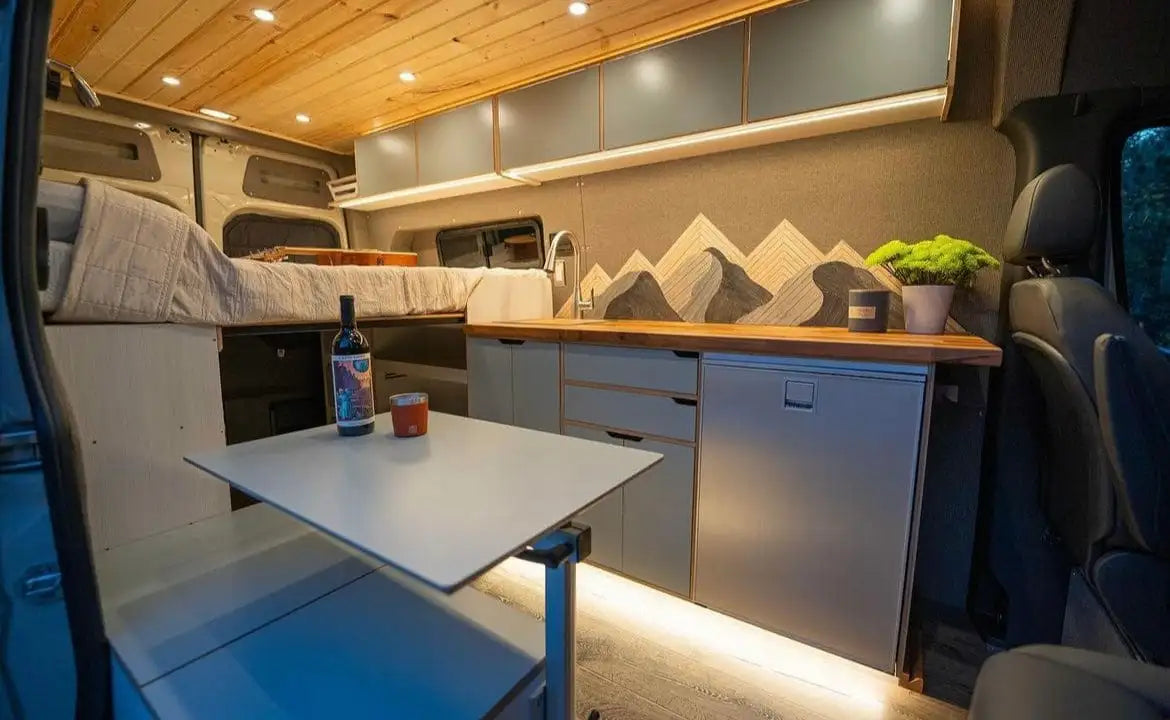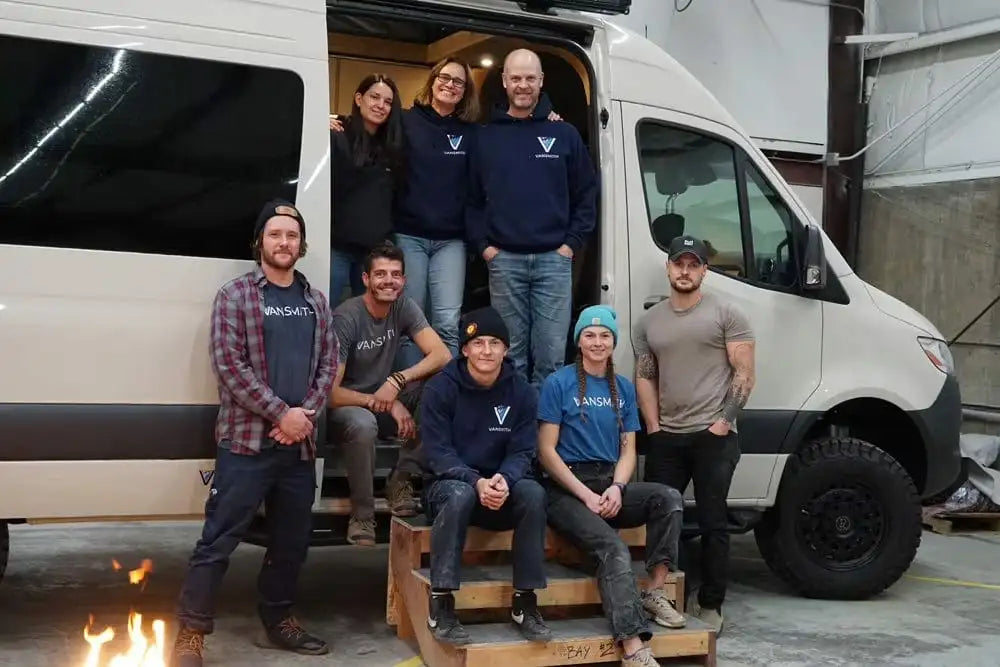If you’ve ever planned an epic road trip, you’ve probably wondered what’s the difference between an RV and a camper. While both offer a way to explore with the comforts of home, the terms are often confused. In short: all campers are RVs, but not all RVs are campers. The right choice depends on your travel style, budget, and where you plan to roam.
At The Vansmith, we’ve been helping adventurers build the perfect home on wheels for over a decade. Whether you’re curious about a motorhome or travel trailer, or want to customize your van, knowing the difference will help you plan the journey that fits you best.
What Is an RV?
Definition
An RV, or recreational vehicle, is a broad category that includes motorhomes, campervans, and travel trailers. The defining feature is that it’s designed for travel and living on the go—many are drivable and self-contained.
Mobility
Motorized RVs (like Class A, B, and C motorhomes) can be driven without towing. This makes them ideal for travelers who want quick setup and less hassle at camp.
Cost
New RVs range widely—from budget-friendly Class B campervans to luxury Class A motorhomes that rival condos. Costs can run from $60,000 to over $500,000.
Living Space
RVs typically offer more living space than campers, with amenities like full kitchens, bathrooms, and slide-outs for added room.
Maintenance
RVs require regular upkeep—both as a home and as a vehicle. Engine service, plumbing checks, and roof inspections are all part of ownership.
Storage
Because of their size, RVs often need off-site storage when not in use, especially in urban areas.
Examples
- Class A Motorhome: Large, bus-style RVs with luxury finishes
- Class B Campervan: Compact, versatile vans perfect for solo or couple travel
- Class C Motorhome: Mid-sized with over-cab sleeping
What Is a Camper?
Definition
A camper is a type of RV that’s usually towable (like a travel trailer or pop-up) or a truck bed camper. It’s not driven—it’s pulled or carried by another vehicle.
Mobility
Since campers need a tow vehicle, mobility depends on your car or truck. The benefit? You can leave the camper at the campsite and use your tow vehicle for day trips.
Cost
Campers generally cost less than motorhomes. New models start around $10,000 for basic pop-ups and can go up to $80,000+ for high-end travel trailers.
Living Space
Campers can be cozy or surprisingly spacious. Larger travel trailers offer multiple rooms and slide-outs, while smaller pop-ups focus on sleeping space.
Maintenance
With no engine, campers require less mechanical upkeep than RVs. You’ll still need to maintain plumbing, electrical systems, and the structure.
Storage
Easier to store than most RVs—especially if you choose a small trailer or pop-up that fits in a driveway.
Examples
- Travel Trailer: Towable, insulated, and available in many lengths
- Pop-Up Camper: Lightweight with fold-down walls for compact storage
- Truck Camper: Fits in a pickup bed for off-road access
RV vs. Camper: What’s the Difference?
When comparing the difference between RV and camper, the decision comes down to how you’ll travel, your budget, and how much space you need.
Size
RV: Generally larger, more headroom, and more amenities.
Camper: Varies widely, but often smaller and lighter.
Electrical System
RV: Built-in power systems, often with generators and solar options.
Camper: May have simpler setups—often portable solar or external hookups.
Cost
RV: Higher upfront and ongoing costs due to the engine and complex systems.
Camper: Lower purchase price and maintenance costs.
RV vs Camper: Detailed Chart
|
Feature |
RV |
Camper |
|
Drivability |
Self-contained, no towing required |
Requires tow vehicle or truck bed |
|
Primary Types |
Class A, B, C motorhomes |
Travel trailers, pop-ups, truck campers |
|
Space & Amenities |
Larger, more amenities |
Smaller, often simpler |
|
Maintenance |
Higher (vehicle + home systems) |
Lower (no engine) |
|
Cost |
Higher upfront & ongoing |
Lower overall |
|
Ideal For |
Full-time travelers, long trips |
Weekend warriors, budget-conscious travelers |
Motorhome or Travel Trailer: Which Is Better?
If you want the all-in-one convenience of driving your home wherever you go, a motorhome might be the better choice. But if you already own a capable tow vehicle and prefer flexibility, a travel trailer offers more options for less money.
At The Vansmith, we often see clients who start with a camper and later move to a custom van or RV for longer trips—or vice versa. The beauty of van life is that it’s personal. We tailor to your vision so you get the perfect fit.
Sustainability and Build Quality
Whether you choose an RV or camper, build quality matters. At The Vansmith, we’re committed to:
- Innovative designs that bring comfort to your journey
- Unmatched craftsmanship built to roam further
- Sustainability in every van, using materials like bamboo, birch, and wool
- Personalized attention and support for every client
Final Thoughts
When asking what’s the difference between an RV and a camper, remember this: both open the door to freedom, flexibility, and unforgettable adventures. RVs give you the convenience of a drivable home, while campers offer affordability and flexibility.
Whether you’re dreaming of a sleek campervan, a motorhome, or a towable trailer, the right choice depends on your travel style. And if you want something uniquely yours, we can help you customize your van for the road ahead.
FAQs
-
Are camper and RV the same thing?
Not exactly. All campers fall under the RV category, but not all RVs are campers.
-
Is a camper and travel trailer the same thing?
Most travel trailers are campers, but campers also include truck bed campers and pop-ups.
-
What is an RV vs. a camper?
An RV is any recreational vehicle. A camper is a type of RV, usually towable, that’s smaller and simpler than most motorhomes.




